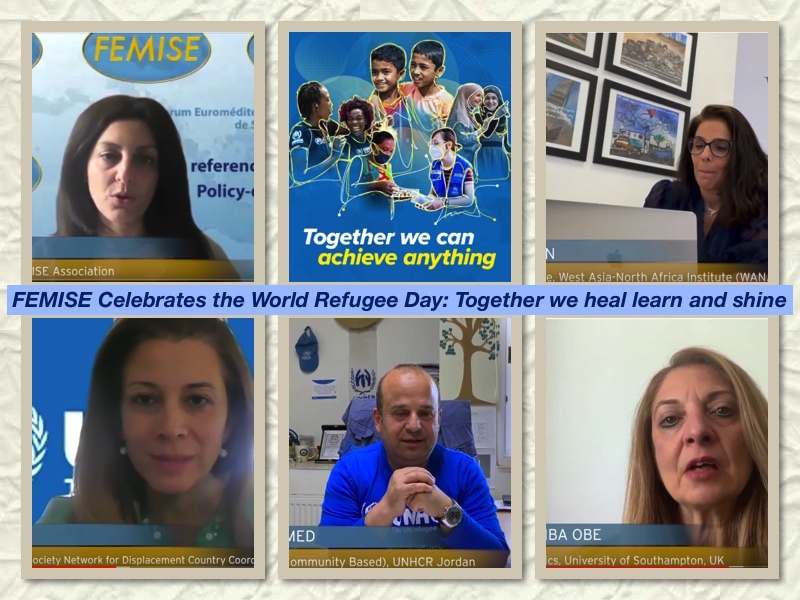
Watch the video on this link (on you tube)
“Only together can we end this pandemic and recover. Only together can we revive our economies. And then, together, we can all get back to the things we love.” -UN Secretary-General António Guterres
In light of the 2021 World Refugee day, FEMISE shares its thoughts with experts from UNHCR, the Civil society and Academia on what is the status of Refugees, how can they be better included in the host societies? What are the main challenges facing their inclusions and what are their recommendations?
As specified by UNHCR, this year’s theme for the World Refugee day is “Together we learn, heal and shine”. A theme that goes hand in hand with what the World is facing during the last two years, especially with the outbreak of the COVID-19 pandemic.
 Maryse Louis, General Manager of FEMISE Association, highlights that this year was not only a challenge to the World refugees but a threat to their livelihoods. She added that “more inclusion and better integration” are indispensable in order to enable refugees to “shine” as key players in the team. She explains that the South Med region is most affected by the Refugees, particularly that two countries of the region: Lebanon and Jordan are the highest countries in the world in terms of percentages of refugees compared to their population (20% and 10% respectively).
Maryse Louis, General Manager of FEMISE Association, highlights that this year was not only a challenge to the World refugees but a threat to their livelihoods. She added that “more inclusion and better integration” are indispensable in order to enable refugees to “shine” as key players in the team. She explains that the South Med region is most affected by the Refugees, particularly that two countries of the region: Lebanon and Jordan are the highest countries in the world in terms of percentages of refugees compared to their population (20% and 10% respectively).
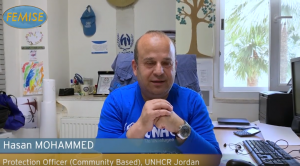 Hasan Mohammed, Protection Officer in UNHCR, explains that many refugees come with skills and expertise that can contribute to the economies, if they are included in the societies. He added that their inclusion in the health, education and sport systems ensures that they are less dependent and make them key participants and not just recipients.
Hasan Mohammed, Protection Officer in UNHCR, explains that many refugees come with skills and expertise that can contribute to the economies, if they are included in the societies. He added that their inclusion in the health, education and sport systems ensures that they are less dependent and make them key participants and not just recipients.
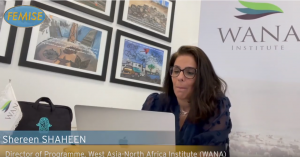 As for Shereen Shaheen, Director of Programme in WANA institute, she emphasized that training of refugees and allowing them to acquire new skills is key to better benefit from their talents and help them meet the new market needs such as the green economy and technology. Also, she highlighted that promoting remote work for refugees can better enhance women, youth and people with disabilities to join in the labour markets.
As for Shereen Shaheen, Director of Programme in WANA institute, she emphasized that training of refugees and allowing them to acquire new skills is key to better benefit from their talents and help them meet the new market needs such as the green economy and technology. Also, she highlighted that promoting remote work for refugees can better enhance women, youth and people with disabilities to join in the labour markets.
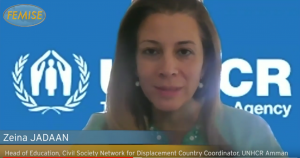 Zeina Jadaan, Head of Education in UNHCR Amman, sheds the light on the growing importance of adequate healthcare systems, education and skills promoting activities, as around half of Jordan’s refugee population is children and youth. She emphasized that children refugees are 50% less likely to access remote learning than national children. She also shared the fact that Jordan is the first country to start vaccination of refugees.
Zeina Jadaan, Head of Education in UNHCR Amman, sheds the light on the growing importance of adequate healthcare systems, education and skills promoting activities, as around half of Jordan’s refugee population is children and youth. She emphasized that children refugees are 50% less likely to access remote learning than national children. She also shared the fact that Jordan is the first country to start vaccination of refugees.
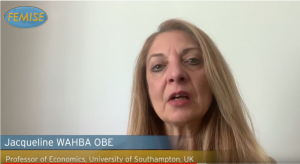 Professor Jacqueline Wahba (OBE) Southampton University resents some findings of her research on refugees where she mentions that there is almost no evidence that refugees have a negative impact on the domestic labor markets. In fact, more refugees lead to more demand & more job creation and to more foreign aid which also means further job creation. According to her research: two important issues to ensure the integration of refugees: first is to facilitate their access to the labour markets and second to integrate refugee children in the educational system. She also highlights that mixed classrooms and training for teachers could lead to better inclusion. For information on Prof. Jacqueline’s research and findings:
Professor Jacqueline Wahba (OBE) Southampton University resents some findings of her research on refugees where she mentions that there is almost no evidence that refugees have a negative impact on the domestic labor markets. In fact, more refugees lead to more demand & more job creation and to more foreign aid which also means further job creation. According to her research: two important issues to ensure the integration of refugees: first is to facilitate their access to the labour markets and second to integrate refugee children in the educational system. She also highlights that mixed classrooms and training for teachers could lead to better inclusion. For information on Prof. Jacqueline’s research and findings:
- DP15528 Ethnic Mixing in Early Childhood: Evidence from a Randomized Field Experiment and a Structural Model:
- The impact of refugees on employment and wages in Jordan:
- Cooperation in a fragmented society: Experimental evidence on Syrian refugees and natives in Lebanon:
And to read the latest FEMISE report on” Repatriation of refugees from Arab conflicts”, click here: EuroMed report: Repatriation of Refugees from Arab Conflicts: Conditions, Costs and Scenarios for Reconstruction – Femise

